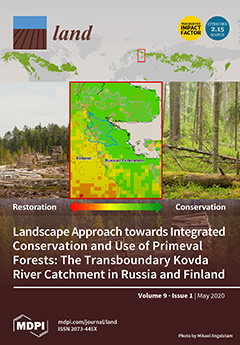Resources
Displaying 1466 - 1470 of 2258Spatio-Temporal Coordination and Conflict of Production-Living-Ecology Land Functions in the Beijing-Tianjin-Hebei Region, China
Assessment of multiple land use functions promotes both utilization efficiency of land and regional coordination. Different personal and public products and services are offered by various land use types, meaning their functionality varies. Lack of judgment on temporal trends, turning points, or consideration of multi-source indicators like the ecological and air quality index leads to uncertainties in urban multifunctionality evaluation and functional orientation.
The Rush for Land and Agricultural Investment in Ethiopia: What We Know and What We Are Missing
More than a decade has passed since the triple crises of food, energy and finance in the period 2007–2008. Those events turned global investor interest to agriculture and its commodities and thereafter the leasing of tens of millions of hectares of land. This article reviews and synthesizes the available evidence regarding the agricultural investments that have taken place in Ethiopia since that time. We use a systematic review approach to identify literature from the Web of Science and complement that with additional literature found via Google Scholar.
Sustainable Residential Building Considerations for Rural Areas: A Case Study
Intelligent use of rural residential land and sustainable construction is inexorably linked to cost; however, options exist that are eco-friendly and have a positive return on investment. In 2011, a research residence was built to evaluate various land-use and sustainable components. This Texas house has subsequently been used for both residential and research purposes. The purpose of this case study was to evaluate break-even construction considerations, to assess environmental impacts, and to evaluate qualitatively efficacy of sustainable options incorporated in the research residence.
Delivering Climate-Development Co-Benefits through Multi-Stakeholder Forestry Projects in Madagascar: Opportunities and Challenges
This paper explores multi-stakeholder perspectives on the extent to which forestry projects that pursue ecological restoration and rehabilitation in Madagascar engage with local communities and can co-deliver climate-development benefits. Drawing on mixed methods (policy analysis, semi-structured interviews, participatory site visits and focus groups) in two different forestry contexts, we show that by strengthening access to capital availability, projects can enhance local adaptive capacity and mitigation and deliver local development.
Coupling Analysis of Urban Land Use Benefits: A Case Study of Xiamen City
The high coupling coordination of urban land use benefits is a significant factor for urbanization and sustainable urban development. This study, based on the statistical data from 2002 to 2017 of Xiamen City, constructs an index system that includes social, economic, ecological, and environmental benefits by evaluating the overall coupling coordination degree of land use benefits, using the entropy weight method (EWM), the coupling coordination degree (CCD) model, and the dynamic coupling coordination degree (DCCD) model.


